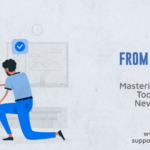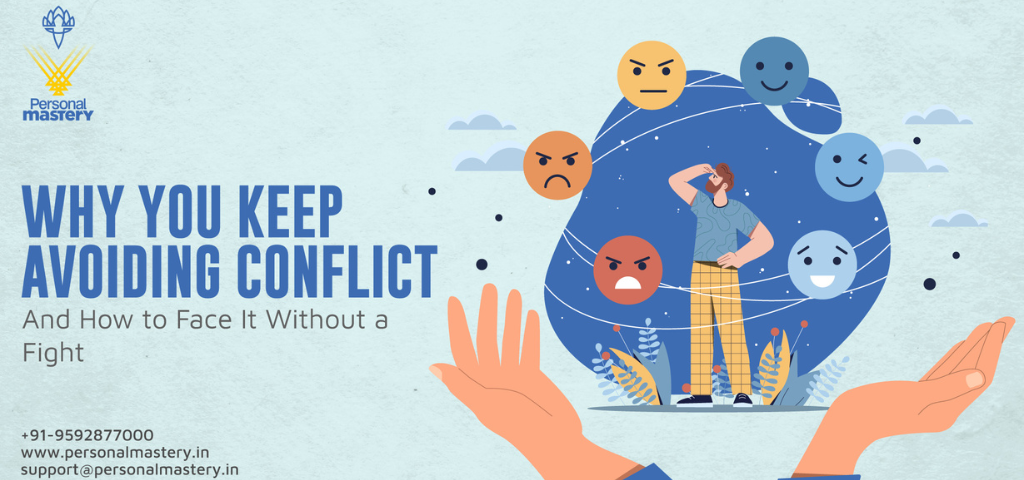
Best NLP Trainer in Kolkata, West Bengal — Discover Your Inner Power Starts Here
July 1, 2025
From Clueless to Confident: Mastering Psychometric Tools Even If You’ve Never Touched One!
July 12, 2025Table of contents
- The Silent Squeeze of Conflict Avoidance
- What Really Happens When You Avoid Conflict?
- The Truth: Conflict Is Not the Enemy
- So… How Do You Face Conflict Without Becoming a Fire-Breathing Dragon?
- When Conflict Hiding Becomes Conflict Healing
- Conflict Isn’t About Winning. It’s About Healing.
- Final Thought: You’re Not Alone, and You’re Not Broken
- Contact Us
Ever walked away from a heated moment, heart pounding, a thousand words swirling in your mind, but none of them spoken out loud?
Maybe it was during a conversation with your partner when something they said hit a nerve… but you just smiled and changed the topic. Or maybe it was at work, when your colleague dumped their responsibilities on you again, and you stayed quiet to keep the peace.
Sound familiar?
We’ve all been there, biting our tongues, pretending everything’s okay while our insides throw a temper tantrum. Welcome to the silent world of conflict avoidance, where emotions get bottled up like soda shaken on a rollercoaster ride. (Spoiler alert: that bottle’s gonna explode someday.)
But what if I told you that avoiding conflict isn’t keeping the peace… is it just postponing the war?
Don’t worry. This blog isn’t here to guilt you. It's here to be your cheerleader, to help you step out of the fear zone and into conversations that actually fix things (without the screaming matches or storming out scenes).
Let’s dive in.
The Silent Squeeze of Conflict Avoidance
Imagine this: you’re in a meeting, your manager assigns your idea to someone else again. Your chest tightens, your throat dries, and just as you're about to say something… you freeze. You tell yourself: “It’s fine. I’ll let it go.”
But it’s not fine, is it?
That’s the trap of conflict avoidance, it tricks you into thinking you’re keeping things smooth, but underneath, resentment grows like mold in a forgotten sandwich.
Signs of conflict avoidance often include agreeing to things you don’t want, pretending to be okay when you’re not, and feeling anxious whenever tension arises. If this sounds like you… you're not alone. You’re just human.
Let’s get something straight: avoiding conflict doesn’t make you weak or bad. It probably started as a survival mechanism. Maybe growing up, you saw fights turn ugly. Maybe your workplace culture discourages speaking up. Or maybe you're just a people-pleaser with an inner peace treaty signed in blood.
But here's the thing: peace at the cost of truth isn’t peace at all. It’s just quiet chaos.
What Really Happens When You Avoid Conflict?
Here’s the not-so-fun science: passive behavior in conflict messes with your self-esteem. Every time you avoid standing up for yourself, your brain logs it as “My voice doesn’t matter.”
Yikes.
Plus, unresolved issues pile up. That one small disagreement you didn’t address? It becomes emotional clutter. Multiply that by months or years, and suddenly one spilled coffee can cause a meltdown. (Cue the dramatic soap opera music.)
Whether it’s conflict avoidance in the workplace or in your personal life, the effects can sneak into every corner of your world, from your mental health to your relationships and even your career.
But here’s the twist: conflict isn’t the villain. It’s how we handle it that matters.
The Truth: Conflict Is Not the Enemy
Let me whisper a little secret to you: conflict is just communication wearing uncomfortable clothes.
When done right, conflict can lead to understanding, growth, clarity, and even connection. Yes, connection. Sometimes, the most honest and powerful relationships are born through tough conversations.
But if your inner voice still screams, “RUN!” Every time tension pops up, don’t worry. That’s where conflict avoidance strategies come into play.
So… How Do You Face Conflict Without Becoming a Fire-Breathing Dragon?
Glad you asked.
1. Breathe Before You Speak
Sounds basic, right? But when emotions rise, your brain goes into fight, flight, or freeze mode. A deep breath resets your system. Try this: inhale for 4, hold for 4, exhale for 6. Magic.
2. Use “I” Statements
Instead of “You never listen,” try “I feel unheard when I’m interrupted.” You’re expressing your truth without attacking theirs. It’s less "mortal combat" and more mindful communication.
3. Know Your Triggers
Emotional awareness is a superpower. What’s behind your fear of conflict? Childhood experiences? Workplace hierarchy? A fear of rejection? Understanding your triggers helps you respond instead of react.
(Emotional intelligence and conflict avoidance are deeply connected when you understand your own emotions, you’re better equipped to handle others’.)
4. Practice in Low-Stakes Situations
Try speaking up when your coffee order is wrong. Or when a friend cancels plans last-minute. Build the muscle of expressing yourself before facing the big league emotional showdowns.
5. Stay Curious, Not Furious
Instead of assuming someone’s out to get you, ask questions. “Can you help me understand why you chose that?” invites a discussion, not a battle.
When Conflict Hiding Becomes Conflict Healing
Here’s a mind-bending truth: avoiding confrontation psychology often stems from the belief that conflict will damage relationships. But the opposite is usually true.
Think about your closest friend. Have you ever disagreed? Probably. But facing those moments together is what made the bond stronger, right?
Healthy communication skills aren’t about avoiding conflict. They’re about navigating it — together. Like two people in a canoe, paddling through the waves instead of jumping ship.
Workplace Warriors, This One’s for You
Let’s face it: conflict avoidance in the workplace is its own beast. Hierarchies, office politics, and performance reviews can make honesty feel risky.
But staying silent can stall your growth.
Start small. If you’re overwhelmed with tasks, say, “I’d love to support this, but I’m at capacity. Can we prioritize?”
If your ideas are being overlooked, gently share: “I noticed my suggestion wasn’t discussed, I’d love to revisit it.”
When you speak up respectfully, you teach people how to treat you. And spoiler: that makes you more respected, not less.
Conflict Isn’t About Winning. It’s About Healing.
Let’s drop the myth that every disagreement needs a winner and a loser. The goal isn’t victory, it's understanding.
Overcoming fear of conflict doesn’t mean you’ll suddenly enjoy confrontations. (Honestly, who does?) It just means fear won’t make your decisions for you anymore.
And that, my friend, is freedom.
Final Thought: You’re Not Alone, and You’re Not Broken
Whether you’ve been dodging conflict for years or you just realized today that something needs to shift, you’re on the right path. The fact that you’re reading this blog shows that your self-awareness is already leveling up.
So, the next time your gut says “stay quiet,” gently ask yourself: Am I avoiding discomfort, or am I avoiding growth?
Then take a deep breath… and speak your truth.
Because you deserve to be heard.
Quote to End On:
“Peace is not the absence of conflict, but the ability to cope with it.”
— Mahatma Gandhi
Contact Us
Phone: +91-9592877000
Email Id: support@personalmastery.in
Address: #748, Sector 9, Panchkula (Chandigarh), Haryana (INDIA) – 134113


